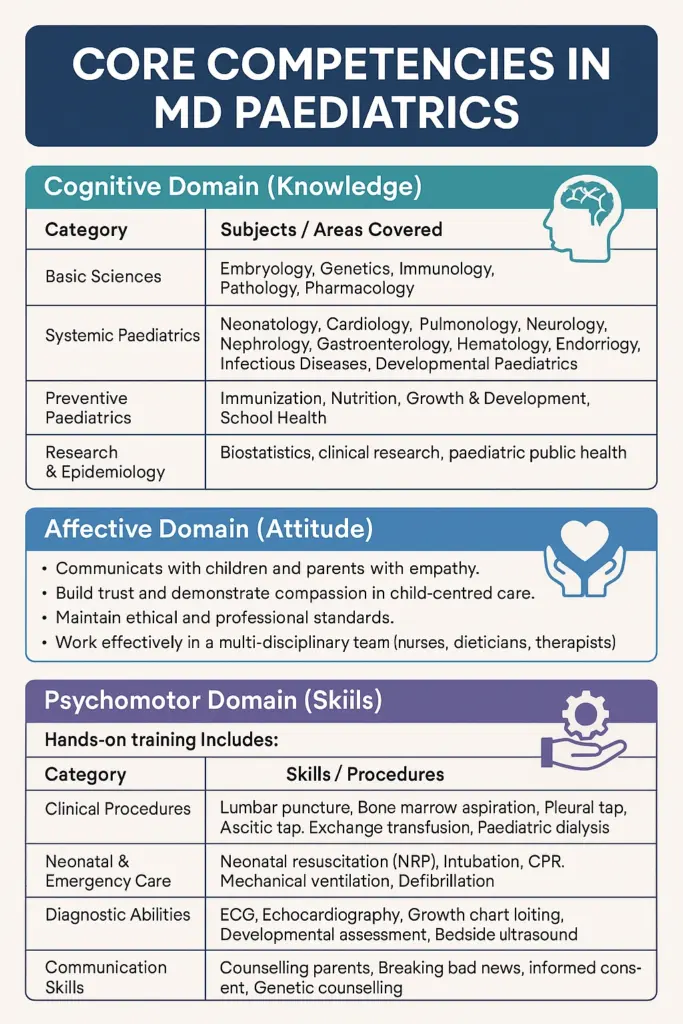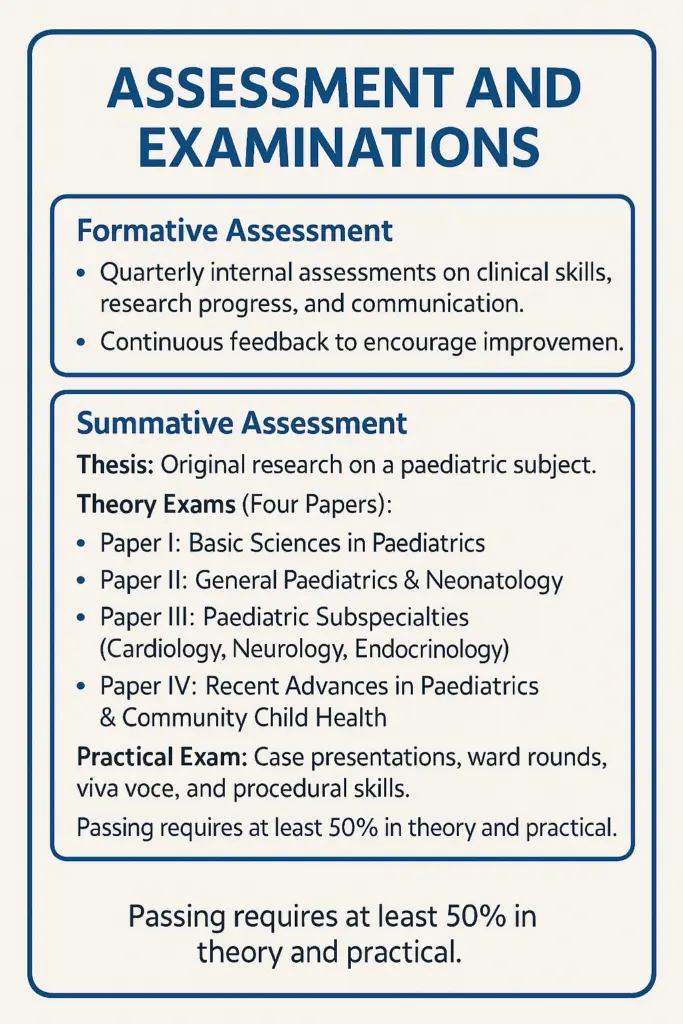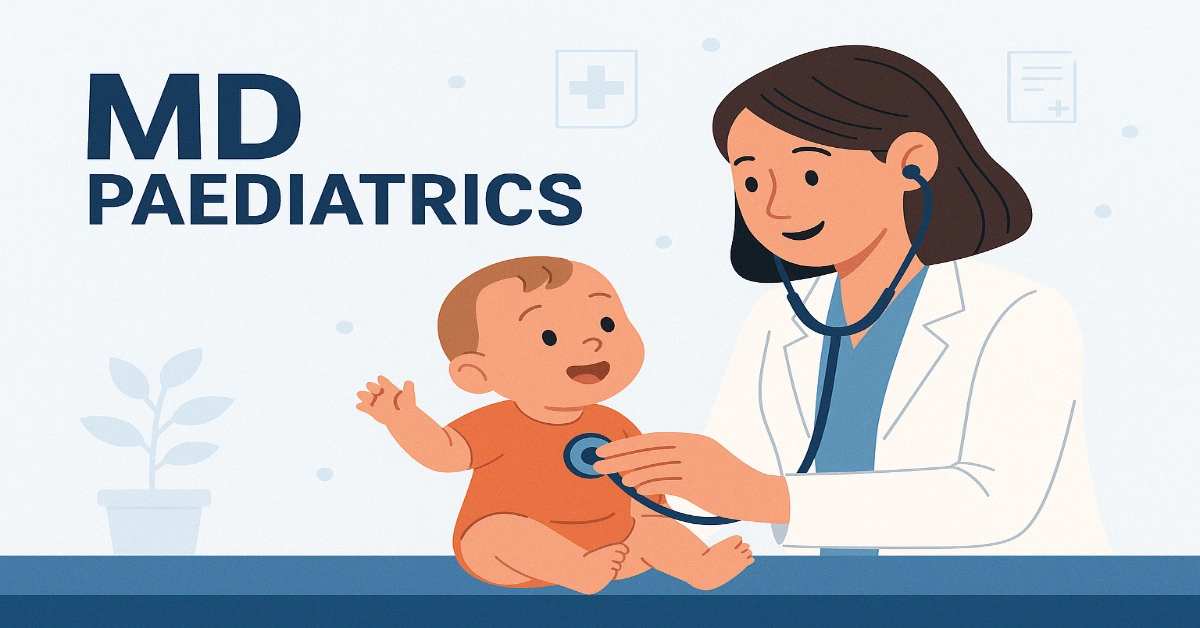MD Paediatrics: Pursuing an MD in Paediatrics is one of the most respected and fulfilling postgraduate medical career options for MBBS graduates. This program is dedicated to child health, covering preventive, promotive, curative, and rehabilitative care for new-borns, infants, children, and adolescents.
The training is structured to prepare doctors not only as clinicians but also as educators, researchers, and public health advocates. Paediatricians play a vital role in safeguarding child health, addressing growth and developmental issues, managing infectious and lifestyle diseases in children, and contributing to national child health programs.
Page Index
What is MD Paediatrics?
MD Paediatrics is a 3-year postgraduate medical course that trains doctors to provide complete healthcare for children. The course focuses on:
- Preventive Paediatrics: Immunization, growth monitoring, and early detection of disorders.
- General Paediatrics: Management of childhood infections, respiratory issues, and nutritional problems.
- Neonatology: Care of new-borns, especially preterm and critically ill babies.
- Critical Care: Handling life-threatening emergencies in NICU and PICU.
- Holistic Care: Addressing psychological, behavioral, and developmental needs of children.
This program prepares doctors to become specialised child health experts capable of managing both common and complex paediatric conditions.
MD Paediatrics Eligibility Criteria
To pursue MD Pediatrics in India, candidates must meet the following requirements:
- Educational Qualification: MBBS degree from a recognized medical university.
- Registration: Permanent or provisional registration with NMC (National Medical Commission) or State Medical Council.
- Internship: Completion of a one-year compulsory rotatory internship.
- Entrance Exam: A valid NEET-PG score with the required cutoff percentile.
The admission is granted through All India Quota (AIQ) or State Quota counselling based on NEET-PG ranks.
Read Also: MD Paediatrics Admission 2025: Eligibility, Scope, Top Colleges, Career Opportunities, etc.
MD Paediatrics Course Duration
The MD Paediatrics course is 3 years long. It combines theory, clinical practice, and research to ensure balanced learning.
| NEET PG Counselling Guide 2025 | |
|---|---|
| MCC NEET PG Counselling Guide eBook 2025 | 📥 Download |
| DNB Counselling Book 2025 | 📥 Download |
Year 1
- Orientation in pediatric OPD and wards.
- Supervised care of common illnesses like diarrhea, asthma, pneumonia, and malnutrition.
- Training in newborn care, vaccinations, and growth monitoring.
Year 2
- Independent management of pediatric emergencies.
- Rotations in subspecialties such as cardiology, nephrology, neurology, endocrinology, hematology, and oncology.
- Start of thesis research.
- Undergraduate (MBBS) teaching responsibilities.
Year 3
- Advanced postings in NICU and PICU for critical care training.
- Independent handling of serious cases like congenital heart disease, neonatal sepsis, or respiratory failure.
- Completion and submission of thesis.
- Preparation for final examinations through seminars and case discussions.
By the end of training, doctors are well-prepared to handle all aspects of child healthcare independently.
Objectives of the MD Paediatrics Program
The program aims to develop paediatricians who can:
- Train doctors to diagnose and treat childhood illnesses effectively.
- Provide emergency and intensive care to critically ill children.
- Promote preventive healthcare through immunization, nutrition, and early detection.
- Monitor growth and development milestones to identify delays or disorders.
- Equip doctors with research and teaching skills.
- Encourage participation in public health initiatives such as immunization drives, malnutrition prevention, and school health programs.
Core Competencies in MD Paediatrics

Cognitive Domain (Knowledge)
| Category | Subjects / Areas Covered |
| Basic Sciences | Embryology, Genetics, Immunology, Pathology, Pharmacology |
| Systemic Paediatrics | Neonatology, Cardiology, Pulmonology, Neurology, Nephrology, Gastroenterology, Hematology, Endocrinology, Infectious Diseases, Developmental Paediatrics |
| Preventive Paediatrics | Immunization, Nutrition, Growth & Development, School Health |
| Research & Epidemiology | Biostatistics, clinical research, paediatric public health |
Affective Domain (Attitude)
- Communicate with children and parents with empathy.
- Build trust and demonstrate compassion in child-centered care.
- Maintain ethical and professional standards.
- Work effectively in a multi-disciplinary team (nurses, dieticians, therapists).
Psychomotor Domain (Skills)
Hands-on training includes:
| Category | Skills / Procedures |
| Clinical Procedures | Lumbar puncture, Bone marrow aspiration, Pleural tap, Ascitic tap, Exchange transfusion, Paediatric dialysis |
| Neonatal & Emergency Care | Neonatal resuscitation (NRP), Intubation, CPR, Mechanical ventilation, Defibrillation |
| Diagnostic Abilities | ECG, Echocardiography, Growth chart plotting, Developmental assessment, Bedside ultrasound |
| Communication Skills | Counselling parents, Breaking bad news, Informed consent, Genetic counselling |
Teaching and Learning Methods
The program emphasizes skill-based learning rather than rote study. Some of the key methods include:
- Bedside teaching in wards and ICUs.
- Case presentations and discussions to develop clinical reasoning.
- Journal clubs, seminars, and symposia for academic learning.
- Simulation-based training for resuscitation and intensive care skills.
- Workshops and CME (Continuing Medical Education) for latest updates.
- Research and thesis writing to promote academic growth.
Assessment and Examinations

Formative Assessment
- Quarterly internal assessments on clinical skills, research progress, and communication.
- Continuous feedback to encourage improvement.
Summative Assessment
- Thesis: Original research on a paediatric subject.
- Theory Exams (Four Papers):
- Paper I: Basic Sciences in Paediatrics
- Paper II: General Paediatrics & Neonatology
- Paper III: Paediatric Subspecialties (Cardiology, Neurology, Hematology, Endocrinology)
- Paper IV: Recent Advances in Paediatrics & Community Child Health
- Practical Exam: Case presentations, ward rounds, viva voce, and procedural skills.
- Passing requires at least 50% in theory and practical.
Career Paths After MD Paediatrics
MD Paediatrics offers multiple career paths, including:
1. Clinical Practice
- Consultant Paediatrician in hospitals or clinics.
- Paediatric specialist in NICU and PICU.
2. Super-Specialization (DM/Fellowships)
Graduates can pursue higher training in:
- Neonatology
- Paediatric Cardiology
- Paediatric Neurology
- Paediatric Nephrology
- Paediatric Endocrinology
- Paediatric Hematology & Oncology
3. Teaching and Research
- Become faculty in medical colleges.
- Contribute to child health research and publish studies.
4. Public Health and Policy
- Work with WHO, UNICEF, and National Health Missions.
- Participate in child health programs, vaccination campaigns, and nutrition projects.
5. Global Opportunities
With licensing exams, Indian paediatricians can work in the USA, UK, Australia, Canada, and Middle East countries, where the demand for specialists is high.
Why Choose MD Paediatrics?
- High demand: Every hospital requires trained paediatricians.
- Wide scope: Opportunities in clinical care, teaching, research, and global health.
- Fulfilling career: Paediatricians make a lifelong impact on children and families.
- Global relevance: Skills are recognized and valued worldwide.
- Contribution to society: Paediatricians help shape a healthier future generation.
MD Paediatrics is a postgraduate course that prepares doctors to be specialists in child healthcare. With training in preventive care, critical care, research, and teaching, paediatricians are equipped to address the healthcare needs of children at every stage of growth.
For MBBS graduates who want a career that combines medical expertise with compassion, MD Paediatrics is one of the most rewarding and respected choices. It not only offers excellent career prospects but also gives doctors the satisfaction of protecting and improving the health of future generations.
Read Also: Top Paediatrics Colleges in India 2025

